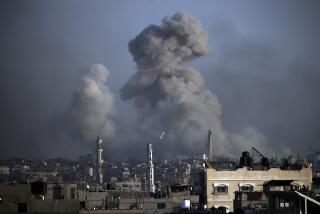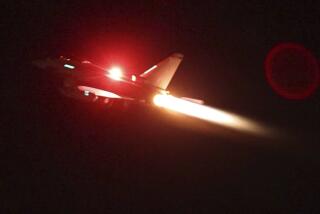The place is a mess, but it beats Plan B
AS KOFI ANNAN’S tenure as United Nations secretary-general limps to its inglorious close, the prestige and even the future of the world organization he came into office determined to revitalize could scarcely seem bleaker.
In the minds of many Americans, the U.N. is little more than a glorified talking shop in which hostility to the United States is perhaps the only common denominator and whose impotence is matched only by its corruption.
Though popular with Americans when he first took over in 1997, Annan — who unwisely came back from a meeting with Saddam Hussein proclaiming that the Iraqi dictator was a man he could “do business with” — soon came to be seen as exemplifying all of the U.N.’s faults. Paradoxically, in much of the world, the U.N. and Annan are denounced for being too servile to Washington — an impression that was certainly bolstered during the recent G-8 meeting near St. Petersburg, Russia, when President Bush was caught saying on an open microphone that he was tempted to “tell Kofi” to call Syrian President Bashar Assad to get him to rein in Hezbollah.
In such an atmosphere of poisonous disenchantment, it is hardly surprising that many U.N. officials (including Annan himself, according to some insiders) despair of the organization’s prospects. A few senior people remain upbeat, notably Undersecretary-General Shashi Tharoor, a longtime member of Annan’s inner circle who is mounting a strong campaign to succeed him.
But for the most part, pessimism reigns, and understandably so: After all, the U.N., which was intended by its founders to be the premier institution for assuring peace and security in the world, now seems to lurch from crisis to crisis in a global environment that offers little peace and even less security.
In fact, despite the personal popularity Annan enjoyed before 9/11, the U.N. already had been marginalized institutionally as a guarantor of peace and security. The dismal failures of its peacekeeping operations in Bosnia (where at least 8,000 people died in Srebrenica alone in a U.N.-protected “safe area” in 1995) and Rwanda (where more than 800,000 Tutsis and moderate Hutus were killed while U.N. peacekeepers looked on impotently in 1994) seemed to suggest that the U.N. was simply too divided and too weak to keep peace, let alone restore it in a conflict zone.
By the same token, NATO’s success (undertaken without Security Council authorization) in rolling back Slobodan Milosevic’s campaign of mass deportation in Kosovo and other unilateral interventions, like that of the British military in Sierra Leone in 2000, which succeeded where a U.N.-sanctioned mission had failed, offered the prospect of effective global peace and security initiatives in which the U.N. would play little or no role. Instead of the sclerotic multilateralism that had failed to save the Rwandans or the Bosnians, we had entered an age of dynamic, unilateral peacekeeping and humanitarian intervention.
Or so ran the conventional wisdom, anyway. In retrospect, viewed through the prism of seemingly unwinnable wars in Afghanistan and Iraq, the picture looks rather different. In a world in which the so-called clash of civilizations is no longer an academic hypothesis but increasingly a reality, at least in the minds and hearts of enormous numbers of ordinary Muslims and Christians who each see the other as bent on all-out war (call it jihad or crusade, it makes little difference), the limits of what Western militaries can accomplish politically has become obvious.
To cite only one obvious example: If the population of Darfur were Buddhist, Hindu or Christian, there would be little risk in sending U.S. or Western European troops to protect them. But because Sudan is a Muslim country, the dispatch of a Christian army there is, rightly or wrongly, almost certain to be understood by much of the Muslim world at large not as a humanitarian effort but as an extension of the wars in Afghanistan and Iraq. Or, to put it another way, one of the unintended consequences of the Iraq war has been to render unilateral humanitarian intervention by the West in the Islamic world suspect in the eyes of many Muslims.
What this means is that unilateralism — and the reliance on “coalitions of the willing” — which seemed so promising in the late-1990s, has turned out not to be a viable alternative to the U.N. system after all. Anyone doubting this need only look at the central role that Annan and the U.N. Security Council played in halting the recent fighting between Israel and Hezbollah. From the outset, it was clear that the Bush administration would have to work through the U.N. and that only a peacekeeping force sanctioned by the world body could possibly be viewed as legitimate by the Lebanese or be effective in maintaining the cease-fire.
Even in the case of the Iranian nuclear program, which the Bush administration has described as posing an existential threat to U.S. security, Washington has opted to work through the traditional channels of Security Council resolutions and U.N.-sanctioned multilateral diplomacy.
In other words, and certainly not through lack of trying, even the most die-hard unilateralists have come to the realization that there is really no viable alternative to the U.N., however much they might wish it otherwise. How else to explain U.S. Ambassador to the United Nations John Bolton — a man who is on record as having said that if 10 stories were removed from the U.N. headquarters building no one would notice the difference — behaving these days like a U.N. booster?
The hard fact is that, despite its fallen reputation and its many failures, the U.N.’s future is perfectly viable because no one has a good alternative to propose. Iraq has certainly demonstrated the American public’s lack of willingness to tolerate long, costly exercises in imperial nation-building. And neither former colonial powers like Britain and France nor rising new powers like China and India want the job of securing peace and security in the world. Which leaves the U.N.
Obviously, this is a negative endorsement, not a ringing accolade, and there is no reason to think that the world body is suddenly going to become more effective in guaranteeing global stability. But just as even Annan’s severest critics have ended up appealing to him in many of the gravest international crises of the last decade, so they will likely tread the same path to the door of his successor, whether it turns out to be Shashi Tharoor of India, South Korean Foreign Minister Ban Ki-moon or some other candidate.
Doubtless they will do so with bad grace, reluctantly and with the full knowledge of how powerless the U.N. actually is. But they will do so nonetheless because there is no viable alternative and because, in this age of civilizational clash and global turbulence, it is far too dangerous for them to do anything else.
More to Read
Start your day right
Sign up for Essential California for news, features and recommendations from the L.A. Times and beyond in your inbox six days a week.
You may occasionally receive promotional content from the Los Angeles Times.






